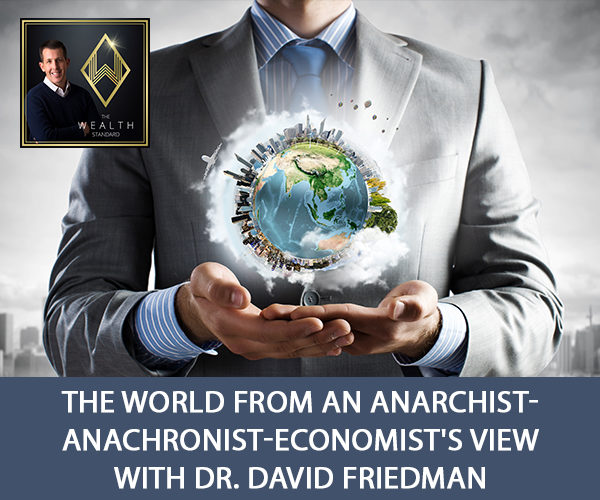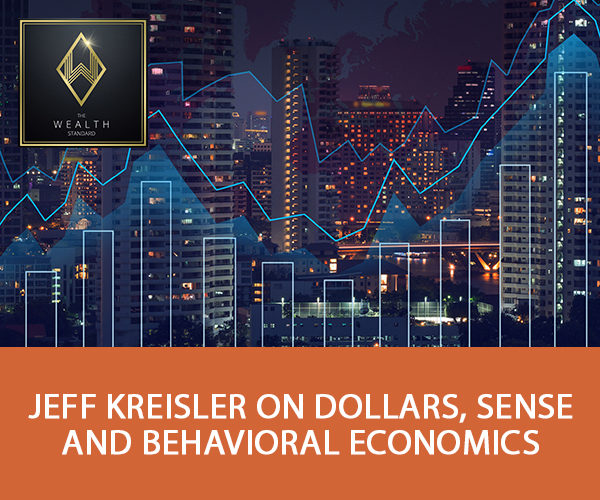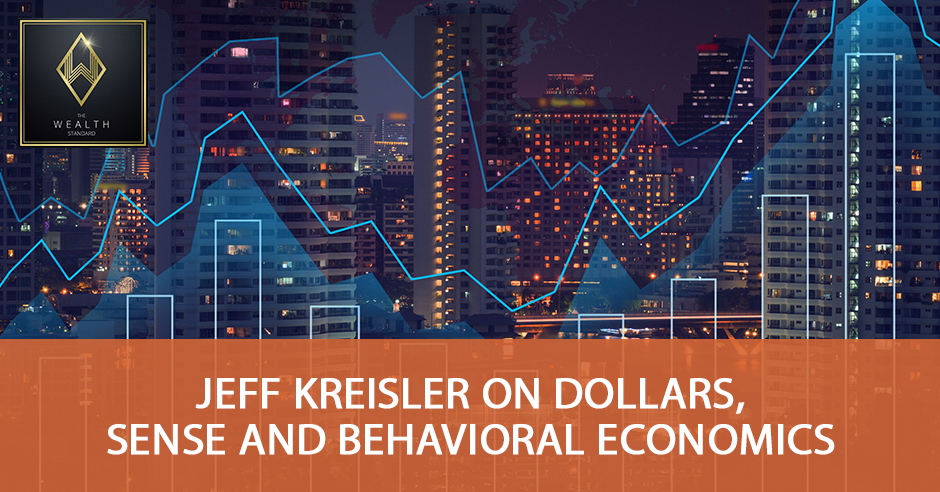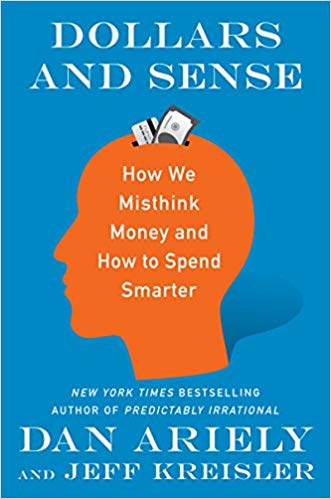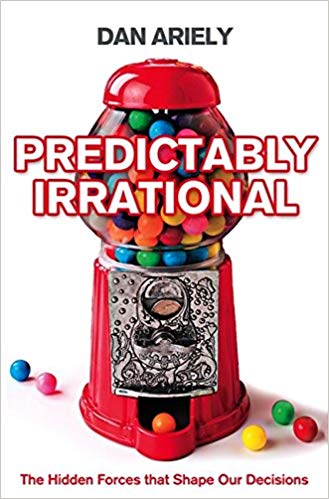The World From An Anarchist-Anachronist-Economist’s View with Dr. David Friedman
Podcast: Play in new window | Download
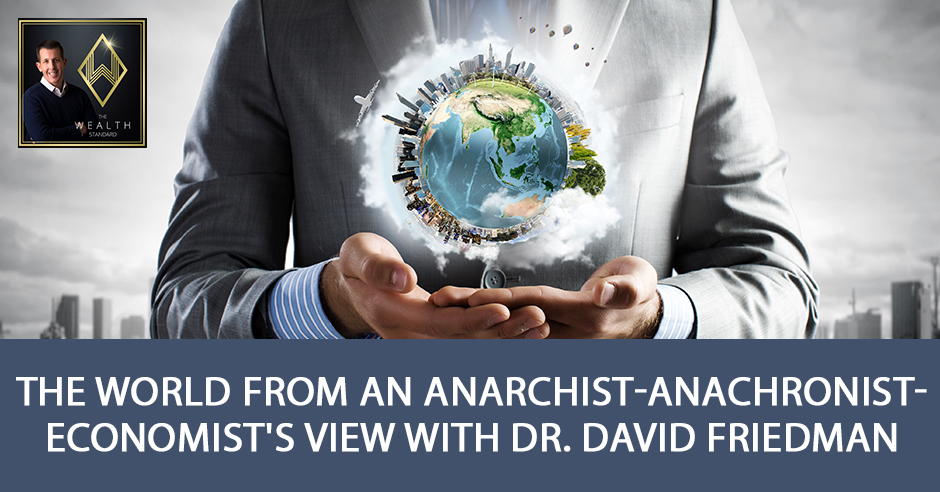
—
Watch the episode here:
Listen to the podcast here:
The World From An Anarchist-Anachronist-Economist’s View with Dr. David Friedman
This episode is an interesting one. It’s an interview with the son of Milton Friedman, one of the most famous American economists. He won the Nobel Peace Prize back in the 1970s. His son is also an intellectual. He has written a few books and also an emeritus professor in law and a few other subjects. This was a profoundly intellectual conversation and it was about some of the philosophy of economics and politics. It got deep and it was intimidating for me because of how it made me think and process some of the information that David was saying. This season of The Wealth Standard is on the entrepreneur, so my intention with David was to get into the environment in which the entrepreneurial mind operates. We definitely got there but it was in a way that I did not anticipate.
If you like what you’re learning on the show, you’re probably asking yourself, “How can I apply this?” That’s why I wrote the book that I released in 2018 called Heads I Win, Tails You Lose: A Financial Strategy to Reignite the American Dream. That saying is interesting. That’s your pretty old saying and it alludes to a system set up for a certain party to win. In most cases, it applies to the political and economic system that we all operate in, which I argue in the book is not set up for us to win but set up for them to win. The book teaches you how to turn that table. For a limited time, you can get the book for the cost of shipping and I’m throwing in the audiobook as well for no cost. Go ahead and head over to FreeBook.HeadsOrTailsIwin.com.
—
David, thank you so much for joining us. I can’t wait for this interview. I’ve been looking forward to it. The best way to start the conversation is the way you describe the world by title, which is the anarchist-anachronist-economist. Would you mind may be going into some details of what that means?
The anachronist is irrelevant for your purposes. One of my hobbies is historical recreation in an organization called the Society for Creative Anachronism. I’ve been involved with that to varying degrees for many years and it’s a lot of fun. I, my wife and daughter cooked from very old cookbooks back to about the 10th century. I build furniture, make jewelry, tell stories and write poems, it’s a lot of fun but it had not much to do with my political interests. They only very occasionally overlap. Economist because economics to me is a way of making sense of the world. It’s not the study of money or prices or whatever. It’s understanding behavior on the assumption that individuals are rational. What we mean by rational is not how they think but that they tend to get the right answer. On the whole, if you want to go somewhere, you’re likely to start in the right direction. If you’d been there a few times, you’re likely to take the shortest route and much more generally, that you can make a good deal of sense. Not perfect sense but a good deal of sense out of the behavior of people on that simple assumption and that’s what economics is built on.
It then becomes a way of making sense of not only what we usually think of as economic behavior but questions such as, “Why are marriages less stable than they used to be? What affects crime rates?” A whole bunch of anything that comes down to human behavior, you have at least a possibility of understanding with economics. That’s what I’ve done professionally for a very long time but it’s also a way of thinking that I find not the only way of making sense of the world but a very attractive and interesting one. Anarchist, what I mean by that is the ideal society would not have a government. I don’t think that a society without a government is stable under all possible circumstances. In that sense, I’m pessimistic but there is a fairly wide range of circumstances in which that society could work.
My first book, among other things, sketched a hypothetical picture of what a society with private property and trade and without government might look like, where you had what we think of as the fundamental government functions all being provided privately. That was published in the early ‘70s and the third edition with another 100 pages or so, came out maybe a couple of years ago. My book, Legal Systems Very Different from Ours, is where I was looking at a whole lot of mostly historical legal systems. I concluded that, in a sense, what I’ve been doing in my first book was reinventing the wheel because there are historical societies in noticeable number in which law enforcement was private and decentralized. I described a number of such societies in the book, Legal Systems.
One of my chapters is a discussion of how societies work. What I sketched in my first book was a fancy modern society version of what those societies were. When you write an economics textbook or teach a course, you may start out with Robinson Crusoe and Friday and a very simplified picture. There’s a sense in which I was doing the fancy version of what the simplified picture of which it had existed. That was one of the interesting things and it was a fun book to write because I ended up learning about Amish, Romany and Imperial Chinese, a legal system that lasted about 2,000 years. It’s one of the world record holders for longevity and in Athens, which I like to describe as the legal system with the mad economists because they’ve got all clever ideas, which might or might not work.
I’m going to skip ahead to a couple of questions that I had for you. With your specific book coming out, as long ago as it did, a lot of things have transpired since then. The updates you’ve made to the book, what’s changed or have you experienced a rise in a stronger centrally planned government than may have existed in the early ‘70s? What has been your experience in looking at that and analyzing it?
After that, it’s true that as far as I can tell, things are changing in both directions at once. On the one hand, a lot of the bad ideas of the early ‘70s are much less fashionable. Everybody takes floating exchange rates for granted for example. General deregulation to some significant degree happened. The trucking industry and the airlines got deregulated. At the same time, environmentalism has, in an odd sense, substituted for socialism. Back when I was writing, a lot of reasonable people thought that something like the Soviet model worked. A fairly popular view was it’s not a very attractive society. It’s not a very free society. Maybe we want to do that but economically it works. They are developing and they’re going to catch up with us and so forth.
Socialism, in the old sense, is dead. Environmentalism has replaced it. Click To TweetWe know that wasn’t true. It is as it were by its own standards was a flop. There are people who call themselves socialists but most of them don’t mean, “We should have the government running the steel industry and the auto industry and everything,” which was the Soviet model. They mean a number of different things, it’s socialism. Even back when I wrote Machinery, I pointed out that socialism had become a term with no content and positive feel-good value because it can mean a lot of different things for different people. The most common usage is to refer to a welfare state like the Scandinavian countries, which are basically market societies. In some ways, they’re more free markets than the US but have quite a lot of redistribution.
Socialism, in the old sense, is dead. Environmentalism has replaced it. In that environmentalism provides a new set of arguments for why the government should interfere with the free market. In one sense, that’s progress because there are better arguments. Socialists resist wrong. The environmentalist argument is not inherently wrong. On the other hand, in practice, you end up with governments doing undesirable things with environmental excuses. Maybe the clearest example of that would be biofuels. The US is the world’s largest producer of corn or maize and the US is turning something like a quarter of its corn crop into alcohol. The excuse for doing this was the claim that would reduce CO2 output. Apparently, it isn’t true. That is as far as I can tell, the people who were serious about environmentalism eventually came to the conclusion that you were producing at least as much CO2 in the process of growing your crops.
The theory of it is that the crops absorb CO2 when they’re growing to produce your maize and then put it back so that’s nothing, but you also have tractors and trucks moving the corn around and so forth. I gather at least that it doesn’t but having biofuels does push up the price of corn and that’s something farmers like. We are putting a good deal of effort into making poor people in the world hungry by making one of the major food crops more expensive in the world on the excuse of environmentalism. That’s true of quite a lot if you look at it, of what’s going on so that environmentalism has substituted for socialism in the sense of a different set of arguments for the government interfering. However, it’s the case that we have no good way of getting governments to do the right thing. The way I like to put it is there is a term market failure which describes most generally ways in which individually rational behavior doesn’t combine for rational group behavior. For people who are familiar with the prisoner’s dilemma, that’s the two-person version of market failures.
Market failure is not about markets. It is a pattern in human behavior which occurs in a whole lot of different contexts. When I give a talk about it, that includes things like the failure of the market to produce the public good where you can’t control who gets it. It also includes rational ignorance and voting because when you figure out who’s the best person to vote for, you’re producing a public good and you’re producing a benefit which almost all of which goes to other people. You have very little incentive to do that and the result is that most Americans don’t know most of the things they would need to know to have a respectable opinion on who to vote for and they’re rational in that. My view at least is that it’s not that the market is perfect, it’s only that the same things that cause the market sometimes to fail caused the political alternative to failing usually. That market failure ultimately comes because I am taking action where you are varying the cost or where you are getting the benefit either way. If I’m taking action where other people bear the costs, it pays me to take it even if the total costs are larger as long as I get a benefit. If I’m taking action where other people get the benefit, it doesn’t pay me to take it even if total benefits are larger in total costs.
On the market, that’s a fairly unusual situation if it takes a semester or so of Price Theory but roughly to a first approximation. When you buy something, you’re paying all of the costs associated. When you produced something, you’re receiving all the benefits as a result of producing it. Roughly speaking, you have the ideal situation where each individual actor gets the benefits and pays the cost of his action and then he takes the right action. There are exceptions but those are exceptions on the market and those are the normal situation on the political system. A political system almost never does someone making a decision to bear the costs or receive the benefits of it. The result is that with environmentalism, you’ve got a legitimate argument for why if the government did the right thing is it could improve things but the government mostly doesn’t do the right things and therefore, it becomes an argument that has bad effects.
I understand that they don’t do the right things because there are benefits when they make decisions but the consequences don’t necessarily exist.
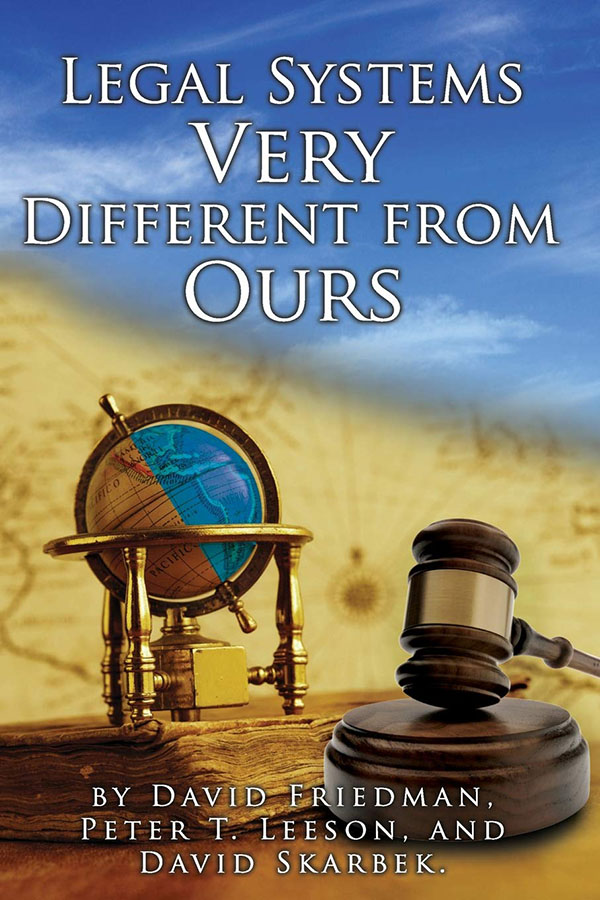
Legal Systems Very Different from Ours
To begin with, if you took the global warming argument seriously, no country would do anything at all about it unless they had an agreement with all the other countries to do it. I’m in California and it does various expensive things to reduce CO2 output. California CO2 output is less than 1% of the world’s CO2 output. Hence, anything it reduces means that temperatures 100 years from now will be perhaps 100th of a degree centigrade less than they would be if they didn’t do those things. It’s absolutely crazy to do them if you’re thinking of people in California benefiting California by controlling global warming. On the other hand, there may be other reasons to do them as in my biofuel’s case, which is in California but the US federal government, you can get the votes of farmers. Al Gore to his credit, admitted at one point that he was pushing biofuels because he was running for president and it was an early primary. That was a point after he decided it was a mistake.
Because it would help farmers.
Yeah, it would increase the income of farmers by bidding up the price of one of their main crops.
Let’s take a couple of steps back because your view of the world is significant and your explanations have been incredible. You’ve been influenced to be aware of economics and be aware of society in a different way from your family history, which is Milton Freidman being one of the early parts of the Chicago school of economics. Maybe talk a little bit about some of the things that he did that influenced you the most and why?
One thing was lessons in child-rearing. In my view, there are two theories of children. One is that they are pets who can talk and one is they’re small people who don’t know very much yet. I believe in the second theory. As far as I can remember, I never had an argument with my father where he said, “I’m the grownup, I’m right.” It was always, “Here are the reasons.” If I had better reasons, fine. If he has better reasons, fine. That was a very important lesson about interacting with people in general, even at the level of an adult interacting with a child. That would only be one important lesson. My general approach to economics has been very much influenced by his. The way I think of the Chicago school approach, I consider myself a Chicago school economist, is that economic theory gives you plausible guesses but not certain conclusions. It’s very hard to think of any real-world conclusion, which couldn’t be truly consistent with economics. If you make sufficiently extreme assumptions about things like what people value or how you produce things, which economics doesn’t tell you.
Economics takes utility functions, which is what people value and production function, which is how you make stuff as somebody you get from the outside. My example of that used to be the Minimum Wage Law that Jim Buchanan who was a colleague of mine early on used to say that all economists agree that Minimum Wage Laws cause unemployment. That’s not an empirical statement. That’s a definition of an economist. He’s wrong because although you would certainly expect it to happen, you can imagine some circumstances in which it would. My old example was to imagine that there are a lot of consumers who hate the thought that they’re buying something produced by very low wage labor and therefore, they’ll buy more of the stuff that the unskilled labor is produced if it’s paid more. That used to be my example but in fact, there was an article a long time that got quite a lot of attention.
Unfortunately, it has bad effects, but it was a good article in which somebody had an economic theory, which didn’t require his wild assumption in which increasing the minimum wage under some circumstances would increase the employment of low skilled workers. It was a very clever idea. It had to do with assuming that the employers were monopsonies, were monopoly employers and were therefore hiring fewer people in order to hold wage levels down. If you push the wage level up and they can’t do it anymore, then they hire more people. Unfortunately, it’s then get used by people who want to push high minimum wages, which I incur a mistake.
Nonetheless, it demonstrated that not only could you make a wildly unlikely argument for this wrong conclusion. You can make a non-absurd argument for this wrong conclusion. The Chicago method, as I understand it, is you form your conjectures from the theory and you then find ways of testing them against real-world facts. My first journal article a very long time ago was an economic theory of the size and shape of nations in which I claimed to explain features of the map of Europe from the fall of the Roman Empire to the present. I submitted it to the Journal of Political Economy. George Stigler, who was the editor, rejected it on the grounds that I had no empirical tests of my theory. How do you test the theory about the size of nations? I thought of some ways and some predictions the theory made about certain patterns of the shapes of countries at various times.
Market failure is not about markets. It is a pattern in human behavior which occurs in a whole lot of different context. Click To TweetI revised the article and George accepted it. One result of that was I have a little more evidence that my theory is true. The other result it turned out was that I had to think much more carefully about what my theory actually was saying in order to figure out how to test it. If you’re trying to link your mathematical model to the real world, you have to be a little more careful about what each term needs. In that sense, a good methodological approach for economics is to use the theory to figure out what you think is true and then say, “If I am right, what implications will it have? What facts or reality that I don’t already know could I observe to test the theory?” That was certainly, I suppose, the largest intellectual influence. My father was a classical liberal. I am a more extreme classical liberal, anarcho-capitalist. It was certainly an influence on me in that way as well. In terms of formal economics, I may well have learned more from other things.
One of the questions I wanted to ask relates to this point, which is how you have come to understand freedom and the different theories of economics that are out there and how has it changed over time? You went back to the past and started to understand patterns and identify patterns. It seems like a lot of the cause of the lack of progress or the cause of cycles is in part by the same force, which as from what you’re saying is a central drive from a government power as opposed to it being done by the people.
There are a bunch of reasons why things aren’t as good as they should be. Certainly, one of them is that governments have the wrong incentives. Another one, going back to my rational ignorance point, is that voters in a democracy have the wrong incentive. That it makes very little sense unless you’re an extraordinarily benevolent person to spend effort figuring out what policies are best for your country. Yet the sensible thing to do if you’re going to be involved in politics is to figure out what political position will make you most popular with the people who matter to you, who might be your family or might be your neighbors, they might be your coworkers and persuade yourself of that policy. There’s some very interesting work by Dan, a Yale law professor, who has looked at issues where positions have become markers of group identity. If you think about evolution for example, that saying you’re against evolution puts you in a particular group as it were or views on global warming or gun control, those would all do that.
His claim is that if you measure how intellectually able people are, the more intellectually able someone is, the more likely he is to agree with the group he’s a part of holds, whether that means believing in evolution or not believing in evolution. He has an explanation for this. He says, “This is rational behavior because whether I believe in evolution as essentially no effect on the world, it’s going to happen with or without me. It has a large effect on my relation to the people around me.” If I’m a professor at an elite American university and I say that I don’t believe in evolution, all of my colleagues are going to say, “Look at that stupid non-educated fellow.” If I’m somebody living in a small town where everybody is a member of the same fundamentalist church and I say, “I believe in evolution,” nobody’s going to want to marry my daughter or me. In that sense, he’s right that it makes sense that it’s in your interest not to believe what’s true in those contexts.
You want to believe what’s true in things where your decisions affect you. You want to believe what’s true about what cars will or won’t run. Whether there’s global warming, it doesn’t much matter from that standpoint, but it matters for how you get along with people around you. In that sense, we do not have a good mechanism for making those decisions. There isn’t one and I’ve argued in the past that shifting more and more things to the market at least gets you closer. There’s this famous quote from Winston Churchill, “Democracy is the worst form of government ever invented by the mind of man, except for all of the others that have been tried.” People usually take that as a defense of democracy, but it isn’t. It’s a critique of government. What it’s saying is the best form of government we have works terribly. I take that as an argument saying wherever possible, shift things away from the government model to the market exchange money. I like to say that the very best form of government is a competitive dictatorship. That’s how we run restaurants and hotels. I get no vote on what’s on the menu but an absolute vote on whether I go to that restaurant and then the person running the restaurant has an incentive to put the things on the menu that his customers want.
I like to shift as much in that direction as possible. What I’ve argued is that you may be able to move everything in that direction. There will still be problems because as I say, the market doesn’t always get the right result and it’s got better odds than the alternative. If you can’t do everything, you can at least move a lot of things in that direction but that’s been my view. I’ve thought through it a little bit more over the years but that’s been my basic view for a long time. The only view I can think of that has changed is I am less optimistic about using the tort system as a substitute for regulation. You think about what seemed like a good argument, which is to say you don’t need to have regular rules against people doing bad things because you can have them sued instead. That only works if you believe the legal system does a good job of figuring out who damaged whom.
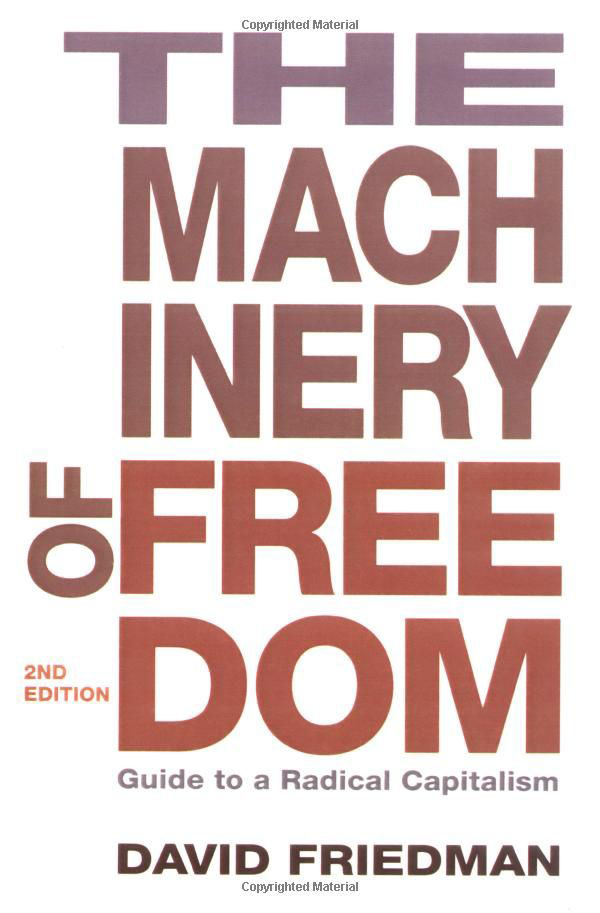
The Machinery of Freedom: Guide to a Radical Capitalism
We’ve had a case, which hopefully is not finished, but where somebody was awarded a multibillion-dollar judgment against Monsanto for a product which essentially everybody who is seriously expert in it believes is harmless, but they claimed they got cancer due to it. Some people got cancer. If you’ve got cancer and you handled Roundup glyphosate, you can claim and you can even believe it’s because of that. If you can persuade a jury, first they figure out the cause of cancer, then they say, “We want to punish them because of all these other people.” You can get very bad results. At this point, I’m less optimistic about that as an alternative. The system I want is one in which the laws themselves are generated on the market. That’s what I sketch in Machinery of Freedom, that would do better. I have one chapter in the new edition on market failure on the market for law in which I’m discussing where my best system will still give the wrong answer and then there are places where it predictably will. It’s that I don’t know of anything better.
We’re definitely complex creatures.
There are a lot of us and we are interacting in complicated ways.
You are maybe going on a different angle. This season, I’ve tried to focus on the entrepreneur and the value that they have in the world. As you’ve understood economics and as you’ve understood markets, how do you describe the role of the entrepreneur?
It’s not something I’ve thought about very much that the kind of economics we understand best is Price Theory. It usually starts out by assuming that everybody makes the right decisions. It’s therefore missing a lot of issues necessarily of the person who figures out that everybody else is doing it wrong and then does it right. Individually, I believe in that and that I have various points. I’ve made investments where I was basically betting my prediction of the future against the market prediction. The first one was when I bought Apple stock and that was when the Macintosh first came out, the original Mac. I was a professor at Tulane Business School at the time. I told one of my colleagues that I was planning to buy a Mac and he said, “Why don’t you get a PCjr instead?”
It occurred to me that was a natural question for him to ask because they’re about the same physical size. It was an absurd question to anybody who was familiar with the technology because the Mac was one of the very first machines to use a graphic interface, which is what we all take for granted. I knew about graphic interfaces because I had seen a movie about the Xerox PARC work with the original graphic interface. I also knew that the processor the Mac used was a Motorola 68000, which was a much more powerful processor than the probably 8086 or 8088 that the PCjr used. It was one before that was normally used from multi-user machines. Why was that? Because running the graphics interface takes a lot of horsepower. There’s a lot of processing invisible to you as the user that goes on to do it in the way we now do it rather than doing it in the way we had done it.
I had a computer before that, neither of those before the Mac existed. I knew about the normal way of doing what’s called a command-line interface, which is much clumsier but much easier with the computer. I said, “I know that his question is silly. His question is the question that almost everybody investing in the market would ask.” A very small fraction of the people in the market a long time ago were sufficiently into computer technology to know about Xerox PARC, to know about graphics interfaces and to know about different processors. Therefore I said, “The market is probably pricing Apple correctly in every other respect. They’re missing a very large positive, therefore the stock is underpriced.” I wasn’t an entrepreneur in the sense of starting a company, but I was willing to bet against the world. I’ve made a number of such bets, some of which had done very well.
Going to that example, you identified something but then also the nature of the Mac coming into the marketplace. They understood that there would be a competitive advantage possibly maybe it was a bet that they made but there’ll be a competitive advantage having a more graphic interface because of how people respond to colors and to graphics.
You want to believe what's true in things where your decisions affect you. Click To TweetIt’s not responding to colors and graphics. It’s the difference between doing something by moving stuff around on the screen and doing something by typing in words. We try to imagine eating dinner using a text-based interface and you say, “Take a fork, stick a fork in spaghetti, twirl fork around, move fork,” as opposed to fork. It was a much easier and more intuitive way of interacting. I should say Bill Gates knew it too. My second successful investment was in Microsoft. The reason there was that I observed that the dominant word processor and spreadsheet on the Mac were both made by Microsoft. I said, “Why in the world is Microsoft investing its resources in a platform where they have no advantage?” Microsoft was running the operating system for MS-DOS at the time because it was pre-Windows, yet they are willing to go to a considerable effort to have a word processor and a spreadsheet on the Mac OS where they’ve got no advantage over anybody else.
I know that graphics interfaces are the path to the future. I bet Bill Gates knows that too. I know that you can’t run a graphics interface successfully on the current PCs because they don’t have enough horsepower to do it but that’s going to change. Processes are getting faster. The people building those computers are going to build faster computers. I bet what Bill Gates is doing is using the Mac, which is a tiny market compared to the PC market, as the testbed to develop a word processor and a spreadsheet that worked well in a graphic interface. Then in another few years, when his world moves to graphic interfaces, which was Windows, he’s going to walk into the market already having his testing programs. That’s in my view why Word and Excel are the dominant word processor and spreadsheet. I said, “If Gates is clever enough to do that, I ought to buy stock in this company.”
Do you define whether it’s Steve Jobs or Bill Gates and their drive to come up with these products that don’t necessarily exist or to make these company decisions to test and eventually get on the marketplace, do you describe that as an entrepreneurial drive?
That’s entrepreneurial behavior but it’s not something that I can fit into economics beyond observing that exists. There are other things like that. There are technologies that are very important to the economics that we don’t understand.
Is it natural for that behavior to occur if you have a specific type of framework?
It probably occurs in most frameworks though. I bet there were entrepreneurs in the Soviet Union and they were entrepreneurial about different things. They were entrepreneurial about. “How do I get my kid into a good school? Who do I have to do favors for?” It was a perverse system so they weren’t doing useful things mostly. There are certainly social entrepreneurs, people who are good at making other people like them and good at creating friendship groups. Entrepreneurial behavior is broader than the market, but it certainly plays an important role in the market. Let me give you a different example of a technology I don’t understand though I appreciate it and that’s why some companies are happy. There was a lumber yard near here, which unfortunately no longer exists. My general feeling buying lumber there for projects I was doing was the people there liked each other and liked their customers and felt like that kind of place.
On the whole, I get that feeling about Southwest Airlines. I like riding them and everybody tries to give that impression. I’m sure to some extent it’s true of some of the competitors. How do you do it? If you are the president of a company, what are the decisions that result? You can see it’s not a trivial problem because, on the one hand, you want to punish employees who do a bad job. On the other hand, punishing people will make you unpopular with them and their friends. There’s clearly a highly developed technology for running companies. All I can say is for me as an economist, that’s a black box that we describe it as a production function. You put some inputs in and you get some outputs out and you might be able to observe the production function but don’t understand it. It’s just as I don’t understand the details on how they make cars. That’s got to be very complicated.

Anarchist Anachronist Economist: Behavioral economics explains why people make mistakes and why lots of people make the same mistakes.
I was reading a review of a book, which was discussing the difficulty of primitive technology. It was an interesting story but I don’t know if he’s right. His account is that there are a number of cases in the nineteenth century where you’ve got European explorers who end up somehow stranded in an environment where the local primitives are doing fine and starve to death. His point is that surviving as an Eskimo or surviving as a hunter-gatherer in the Amazon requires a lot of very sophisticated skills. He goes through details of this long sequence of things you have to do to hunt seals, most of which would never occur to you. One of the main foods in South America is manioc, which is poisonous. Therefore, there are elaborate procedures for purifying it. There are lots of technologies we tend to think more about modern technologies but human beings have been doing complicated things for a very long time.
Have you studied behavioral economics or looked into what drives people? Why do they behave and do certain things based on certain circumstances?
I’ve read Kahneman’s book, Thinking, Fast and Slow. It was a very good book and that was our Christmas book. It was the book we gave as a present to anybody we didn’t have a present for. What he’s doing is explaining why people make mistakes. The basic logic of that book is that we have two different metal machines for doing things, what he calls the fast mind and the slow mind. The slow mind is what we normally think of as thinking rational thought. When I look at a screen, what I am seeing is not some gray here and some pink here, some little round brown circles with black dots in the middle there. I’m seeing a human face and a wall of an office and eyes and pupils and so forth. I’m not doing any explicit analysis to do that. I’ve got incoming a pattern of colors and yet very fast background processing. It resolves that into a picture of what I’m actually seeing.
Kahneman’s argument is that the slow mind is a very scarce resource that consequently, we can’t afford to think everything through. We have a whole bunch of rules of thumb which worked pretty well but not perfectly for the 99% of our thinking that’s done in the background. If you analyze what those rules of thumb are, you can sometimes figure out what mistakes we’ll make. That’s a neat idea. I don’t think I’ve seen any interesting economics using that. Certainly, people are trying to use that in economics but that’s because, in order to be a successful academic, you’ve got to do something that looks new. If you have an issue that smart people have been thinking about for 100 years, saying something new about it is hard. One way is saying, “We’ve got a new approach. We’ve got this thing called behavioral economics. Let’s do the behavioral economics of X, Y and Z.”
Maybe there’s something good being done in there but I haven’t actually seen anything which struck me as my knowing anymore as a result. What I want people to do behavioral economics with is not my field. It’s macroeconomics. If you think about why there are recessions and depressions, involuntary unemployment and stuff like that. In the part of economics that I understand, none of that happens. In ordinary Price Theory, prices always moved quantity supply to quantity demanded labor like everything else. It’s a nice model. It’s something we understand and it describes quite a large part of reality but it clearly doesn’t describe all of it because you do have these episodes. I don’t do macro but as far as I can tell of the people who do macro, almost all of them involve a theory in which people are making the same mistake over and over. What the mistake is buried with a different version of macro.
As best as I understand Austrian Business Cycle Theory, which I don’t understand very well, it involves the idea that the government produces money, drives down the interest rate and businesspeople then assume the aggravate will be low forever. Make investments on that basis and then discover lo and behold, the government stops producing money. Interest rates go back up. We’ve got to liquidate a bunch of stuff but that’s stupid. It will be stupid the sixth time it happened. You would say after a while, “We know why interest rates are low. It’s only going to apply for the next year.” Various short-term investments you can do even if they pay with a low-interest rate than long-term. Similarly, the simple versions of Monetarist Business Cycle Theory are, as I understand it, that you’ve got some level of rate of increase in the money supply will result in a certain level of inflation. Everyone takes that for granted, then the government stops increasing the money supply.
Workers still expect the annual wage rise implied by that inflation but at that wage, employers don’t want to hire as many workers as they want to work. You’ve got unemployment. You would think that after a few times, people would start saying, “Let’s watch the money supply figures.” One of the things that behavioral economics does is explain why people make mistakes and why lots of people make the same mistakes. I want somebody who’s interested in macro to see if he can use behavioral economics in order to explain why people don’t solve these things in the way I’m describing but that’s not my project. That’s just a project I’m trying to sell it to someone else who does stuff. I have a variety of such projects that I try to get other people interested in.
The slow mind is a very scarce resource that, consequently, we can't afford to think everything through. Click To TweetWhat are ways in which the audience can learn more about you, follow what you’re up to and some of the projects you’re working on and so forth?
To start with, I’ve got a webpage which is DavidDFriedman.com. On that webpage, there are links to most of my published articles and the full text of several of my books. That’s probably the easiest way. There’s also a link to my blog and it has interesting stuff on it but I post very rarely to it because I got interested in somebody else’s blog, which has a lot more activity and lots of interesting conversations. Mostly, I’m doing things on Slate Star Codex, which is the name of a blog that I don’t run but where I participate. In terms of my writing, I have a book called Legal Systems Very Different from Ours. You can get on Amazon and it’s a very inexpensive Kindle. I don’t remember whether I made it $5 or $3 but something like that. The Machinery of Freedom, which was my first book and the third edition, is also an inexpensive Kindle as well as the print version.
Not in audio format?
Machinery is also in audio format. I haven’t checked if anybody’s buying it. Part of the reasons in audio format is that I self-published Legal Systems, I needed somebody to do a cover for me. A nice lady on Facebook, who obviously was familiar with my work, designed a very nice cover for it, which I used. She also said that I ought to have Machinery as an audiobook. I figured she’d done a favor for me, I would do one for her and she might be right. It might be useful. Machinery third edition you can get as an audiobook. My only other audiobook is my first novel, which is called Harald and that one I had recorded a long time ago for other reasons and then once audiobooks became important, I figured I might as well turn it into an audiobook. I’d like to do an audiobook of Hidden Order but that depends on whether or not we get the rights back from the publisher. I wrote a Price Theory textbook a long time ago and I’m in the final stages of creating a third edition of that as a Kindle, which I’m going to self-publish because it went out of print and when it goes out of print, the rights revert to me.
Hidden Order was basically the Price Theory textbook rewritten into a book for the interested layman. It’s not intended as a textbook. It’s a book to anybody who wants to teach himself economics. I’m sure you can still buy copies but I don’t think they’re actually printing it anymore. I’m hoping that it’s sufficiently out of print and I can get the rights back and then I’ll make that into a Kindle and maybe also into an audiobook. I’m less certain of that. I’ve got a variety of other books people might find interesting. My second novel Salamander, which I like, and I’m going to have a third novel fairly shortly. Those were all for fun. None of them were very successful but some people liked them and I liked them. My book Law’s Order, which is an explanation of the economic analysis of law, which was what I’ve been doing professionally for a good deal for many years. I hope people would find that interesting. I have a book, Future Imperfect, which is looking at ways in which technological change may radically change the world over the next many years.
Is that in the works?
That released years ago and that’s available. I don’t even know if it’s a Kindle because it was commercially published. I wasn’t doing it but it probably is. Certainly, there is a print version. I could make an audiobook, but I need permission from the publisher. That one, my view is that the future is very uncertain. When people talk seriously on we have to solve problems 100 years from now, they’re making a mistake that we don’t know enough about what the world is going to be like 100 years from now to do those calculations. What I’m doing there is looking at a bunch of different technological revolutions that might happen. If it happens, what are the implications? What are the problems? How might you deal with them? After I wrote and published that book, I gave a talk at Google on the book. I started out by saying that I thought global warming was a pretty wimpy catastrophe. Temperatures go up by a few degrees centigrade, sea level goes up by a meter or so in 100 years. I’ve got three different ways of wiping out the human race faster and I do. In fact, you could see I also have on my webpage a link to a whole lot of videos of talks I gave.
Does it include the one you did with Google?
That is in fact there but lots of talks on different things. Some of them are audio and some of them like that one is video. If you go to my webpage, it’s not a very fancy webpage but if you look down and you can find the link to my recorded web talks and interviews, that will give you lots more of those.
David, this has been fascinating. Thank you for taking some time to share your expertise. This went pretty deep but this has been a great addition to this season and people got a lot out of it. Thank you so much.
Important Links:
- www.DavidDFriedman.com
- http://www.DavidDFriedman.com/The_Machinery_of_Freedom_.pdf
- https://Law.scu.edu/faculty/profile/friedman-david/
- David Friedman
- Heads I Win, Tails You Lose: A Financial Strategy to Reignite the American Dream
- FreeBook.HeadsOrTailsIwin.com
- Society for Creative Anachronism
- Legal Systems Very Different from Ours
- Thinking, Fast and Slow
- David Friedman’s blog
- Slate Star Codex
- Legal Systems Very Different from Ours
- The Machinery of Freedom
- Harald
- Harald’s audiobook
- Hidden Order
- Price Theory
- Salamander
- Law’s Order
- Future Imperfect
- David’s web talks and interviews
About Dr. David Friedman
 Dr. David D. Friedman is an American economist, physicist, legal scholar, and libertarian theorist. He is known for his textbook writings on microeconomics and the libertarian theory of anarcho-capitalism, which is the subject of his most popular book, The Machinery of Freedom. Besides The Machinery of Freedom, he has authored several other books and articles, including Price Theory: An Intermediate Text, Law’s Order: What Economics Has to Do with Law and Why It Matters, Hidden Order: The Economics of Everyday Life, and Future Imperfect.
Dr. David D. Friedman is an American economist, physicist, legal scholar, and libertarian theorist. He is known for his textbook writings on microeconomics and the libertarian theory of anarcho-capitalism, which is the subject of his most popular book, The Machinery of Freedom. Besides The Machinery of Freedom, he has authored several other books and articles, including Price Theory: An Intermediate Text, Law’s Order: What Economics Has to Do with Law and Why It Matters, Hidden Order: The Economics of Everyday Life, and Future Imperfect.

